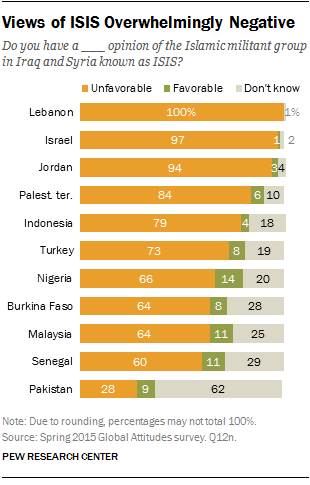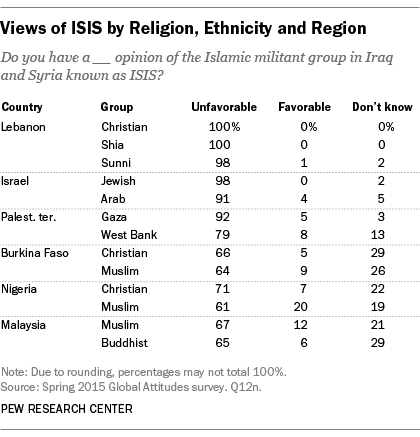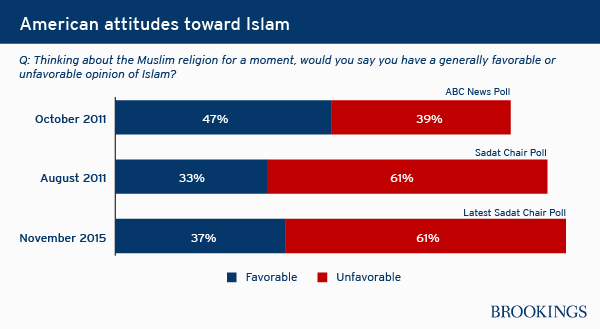Donald Trump Is Dead Wrong About How Muslims Feel About Americans

By:
On Wednesday, Republican presidential candidate Donald Trump told CNN that he believed "Islam hates us" and that "it's very hard to define" or "separate" radical Islamic terrorists from the Muslim population as a whole. Surveys of Muslims in the U.S. and abroad, however, reveal that the GOP front-runner is fundamentally mistaken.
Worldwide, there are approximately 1.6 billion people who identify as Muslim, and the vast majority do not subscribe to the extremist ideology of Islamic terrorist groups such as ISIS. While Islamophobia in the U.S. — which has been on the rise since the terrorist attacks in Paris and San Bernardino — has arguably alienated Muslim Americans, as PBS reports, there's no evidence to support Trump's claim that "Islam" hates Americans.
(It should be noted here that Islam is a religion and therefore incapable of emotional expression; Trump likely meant to describe the sentiment of Muslims, who practice Islam.)
Most Muslims do not support Islamic terrorist groups.
Recent surveys conducted by the Pew Research Center in countries with large Muslim populations show that an overwhelming majority of Muslims are opposed to the actions and ideology of so-called Islamic terrorists organizations. In Jordan, 94 percent of Muslims hold unfavorable views of ISIS, for example. And when it comes to Muslim opinions on acts of violence against civilians — including suicide bombings — the same trend holds true: In Indonesia, 92 percent of Muslims say that such extremism in the name of Islam is "rarely or never justified. And in Iraq, 91 percent of Muslims say the same.
 Pew Research Center - pewresearch.org
Pew Research Center - pewresearch.org
"In the United States, a 2011 survey found that 86 percent of Muslims say that such tactics are rarely or never justified," Pew Research Center reports. "In many cases, people in countries with large Muslim populations are as concerned as Western nations about the threat of Islamic extremism, and have become increasingly concerned in recent years."
 Pew Research Center - pewresearch.org
Pew Research Center - pewresearch.org
How to Americans feel about Muslims?
If you want to understand exactly where Trump's (incorrect) notion that Muslims hate Americans comes from, a recent report from the Brookings Institute offers some insight. Americans tend to differentiate between "Muslim people" and the "Muslim religion" in an interesting way: They tend to view Muslim people favorably and Islam unfavorably.
 Brookings Institute - brookings.edu
Brookings Institute - brookings.edu
Trump for his part has previously said "I love Muslims" on the campaign trail — and then later proposed a ban on all Muslim immigration to the U.S. on the basis of national security concerns.
"This may have many reasons, but at the core, it is probably easier for many Americans — with strong anti-discrimination norms — to express dislike of an abstract idea rather than to appear prejudiced toward people," Shibley Telhami, a senior fellow at the the Project on U.S. Relations with the Islamic World, wrote in the Brookings Institute report. "It may also be partly a function of familiarity."
More on that point from the Brookings Institute.
"[M]ajorities of those who know some Muslims — even if not well — have favorable of views of Muslims; this holds across the political spectrum. For example, only 22 percent of Republicans who know no Muslims have favorable views, compared with 51 percent of Republicans who know some Muslims but not well, and 59 percent of those who know some Muslims well.
"But knowing some Muslims, even well, does not influence American views of Islam as much. While those who know Muslims have slightly improved views of Islam, still, majorities of Republicans and Independents retain an unfavorable view of the Muslim religion. And even Americans who say they know some Muslims very well are divided down the middle in their attitudes toward the Muslim religion."
The takeaway here is that while there is no doubt that so-called Islamic extremist groups are certainly hostile to Americans and Westerners as a whole on ideological grounds, they represent a minority of the Muslim population. And the majority rejects the principles and actions of those extremist groups, so there's no conclusive evidence to back Trump's claim that "Islam hates us" by any available metric.
